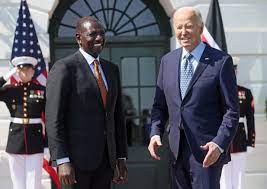The US lauds Kenya as a beacon of democracy while simultaneously undermining it by setting up a US-friendly ruling regime in Kenya. Kenya’s decision to send 1000 police officers to Haiti is a clear indication of this influence.
The US, which occupied Haiti in 1915, continues to exploit it for its strategic location and economic interests under the guise of promoting democracy, and bringing stability. Kenyan foreign policy, far from being grounded in fundamental principles or African values, actually echoes US directives, transforming it into a transactional arrangement that benefits both US interests and President Ruto’s administration.
The Kenyan government’s decision to send 1000 police officers to Haiti is nothing short of a betrayal, reflecting a deep-seated dependency on Western institutions like the World Bank and the IMF after gaining only juridical sovereignty in 1963. This dependency is not just historical; it is an ongoing reality, perpetuated by a Western-controlled financial system that keeps Kenya in a state of neocolonial subjugation. The government’s actions are not driven by altruism or genuine Pan-African solidarity but by a long-standing habit of bowing to Western demands.
Historically, Kenya had consistently aligned itself with Western interests, even when it had to betray broader African issues. In 1978, Kenya facilitated an Israeli operation against Uganda’s Idi Amin, showcasing its readiness to serve Western agendas.
The parade of Kenyan presidents, from Jomo Kenyatta to William Ruto, exemplifies a continuity of corruption and subservience to Western powers. These leaders have stashed their ill-gotten wealth in Western countries, in properties and tax havens, making them vulnerable to sanctions and seizures. This financial leverage ensures that they remain compatible with Western interests, perpetuating a cycle of corruption and dependency.
President William Ruto’s history is marred by corruption and legal manipulation. His indictment by the ICC, followed by the dismissal of his case in 2016, raises serious questions about his subsequent loyalty to Western powers. The fact that his lawyer became the ICC prosecutor in 2021 only adds to the suspicion of a quid pro quo arrangement. This alignment with Western interests has significant implications, including the decision to send Kenyan police to Haiti. The US views Kenya as a soft ally and hopes to obscure its influence in Haiti by involving Kenyan forces.
The Kenyan public, largely disengaged from foreign policy, remains unaware of the implications of the deployment to Haiti. The historical suffering of Haitians under Western oppression is neither acknowledged nor understood by most Kenyans, who are preoccupied with daily survival. This lack of public engagement allows the government to pursue a transactional foreign policy, making deals with Western powers rather than adhering to principles.
Portraying the Haiti mission as a Pan-African effort is misleading, to serve Western interests under the guise of African unity. The substantial budget for the Haiti deployment is likely to benefit Kenyan elites, including President Ruto, rather than addressing the needs of the Haitian people or reflecting genuine Pan-African values.
Former President Uhuru Kenyatta’s wealth, accumulated through corruption rather than legitimate business success, is a testament to the entrenched kleptocracy within Kenya’s leadership. This pattern of self-enrichment at the expense of national integrity continues under Ruto’s administration.
While Haitian Americans protested outside the Kenyan Embassy, calling Ruto a ” Still a Slave” to Western interests, protests like these are rare in Kenya. The brutal Kenyan police force deters public dissent, ensuring that the population remains disengaged and silent.
The Kenyan police operate with impunity, as evidenced by the kidnapping of Dr. Abdiwahab Sheikh Abdisamad, The US` so-called human rights principles are not enforced here for US interest. This lawlessness extends to ignoring judicial rulings; Kenya’s High Court has deemed the deployment to Haiti unconstitutional, but this ruling will be disregarded. In Kenya, the executive branch wields overwhelming power, rendering judicial and legislative checks ineffective. This dominance allows President Ruto to flout constitutional constraints and pursue policies dictated by Western interests.
The West praises Kenya as a liberal democracy, yet this facade masks Kenya’s subservience to Western powers. As Western influence wanes in the Sahel region, Kenya’s strategic importance to the West has increased, further entrenching its role as a compliant ally.
Kenyan police, incentivized by higher pay in Haiti, are more excited to support US ill-agenda. Kenya remains a pawn in the geopolitical games of Western powers, betraying its own people and the broader African cause.








